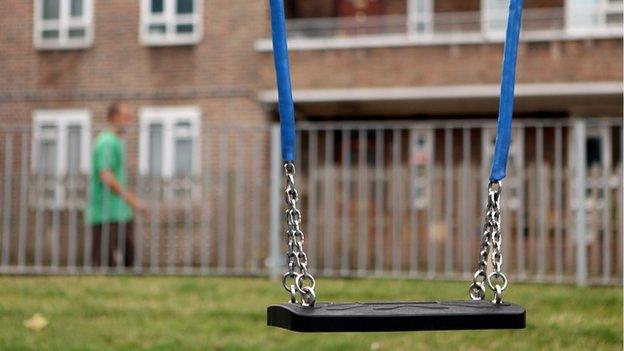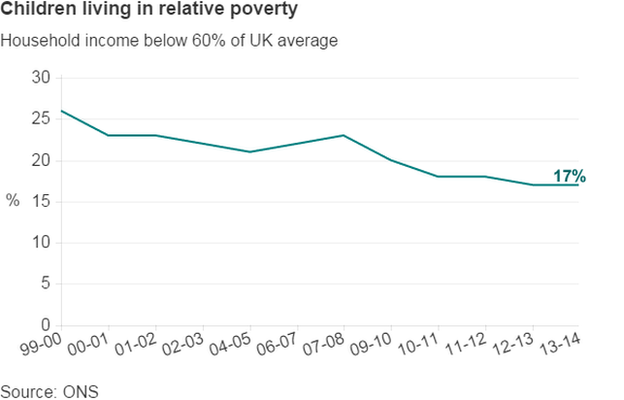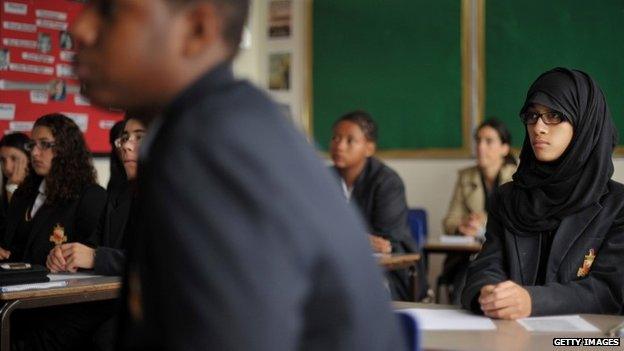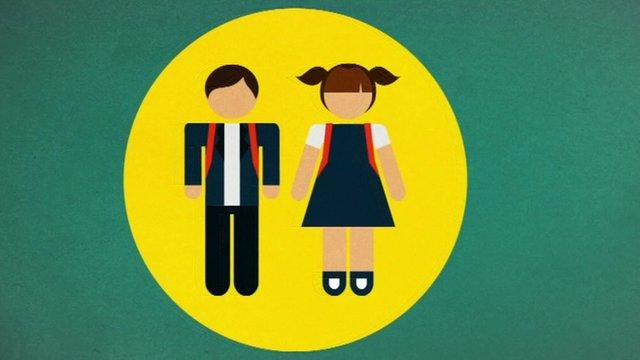Child poverty definition to be changed
- Published

A child is defined as being in poverty when living in a household with an income below 60% of the UK's average.
Work and Pensions Secretary Iain Duncan Smith has announced a new way of measuring child poverty.
Mr Duncan Smith said the new system would focus on the "root causes" of poverty and make a "meaningful change to children's life chances".
It will include factors such as educational achievement and living in workless households as well as income.
It follows a report claiming child poverty levels were "unacceptably high" across the UK.
The four UK children's commissioners, for England, Scotland, Wales and Northern Ireland, urged the government to halt its programme of benefit cuts.
Mr Duncan Smith said he planned to scrap measures introduced by Labour in 2010 - which define a child as being poor when it lives in a household with an income below 60% of the UK's average.
He said this measure was considered to be "deeply flawed and a poor test of whether children's lives are genuinely improving".

Speaking in the Commons, Mr Duncan Smith said the existing framework was overly simplistic and "obsessed by targets", resulting in the skewing of resources and outcomes.
He insisted getting rid of child poverty remained the "central purpose" but the current approach had led to a process of "churning" with people rising above and falling below the poverty line.
"We want to eradicate child poverty. This is not a departure from that proposal," he said. "What we want to do is to ensure, however, that we do this by changing the long-term life chances of those who live in the poorest families.
New legislation, he said, would introduce a "statutory duty to report on worklessness and levels of educational attainment", focused on changes in the number of long-term workless households and GCSE attainment for all pupils.
The government will develop a range of other indicators to measure other causes of poverty, including family breakdown, debt and drug and alcohol dependency, reporting annually on how these indicators affect life chances.
'Welcome start'
Labour said the the Child Poverty Act which underpinned the existing framework had all party support when it was passed in 2010. and repealing it would be the "obituary for compassionate conservatism".
Its spokesman Stephen Timms said the government should be "attacking low pay rather than attacking the low paid".
"What we need is not a change to the definition of poverty, but a plan to deal with poverty, to boost productivity," he said.
Green Party MP Caroline Lucas called the move "punitive" while the SNP's work and pensions spokeswoman Eilidh Whiteford said it was an "absolutely disgraceful dereliction of responsibility".
But Labour's Frank Field, who chairs the commons work and pensions select committee and advised the coalition government on anti-poverty measures, said it was a "welcome start".

Improvements in educational attainment will be one of the new indicators
"We mustn't flit around with general aspirations about educational attainment when we know life chances are determined before children enter school," he said.
"So the measure therefore must look at whether we are equalising life opportunities for the poorest children before they reach school, and that definition will then drive policy to achieve those objectives."
The Children's Society said the proposed new indicators were "inadequate" and would do nothing to help the more than two million children currently living in poverty.
"Income is at the heart of child poverty. Ignoring it will only mean more ineffective policies that continue to fail. This will condemn increasing numbers of children to live below the breadline which is a national disgrace," said its external affairs director Peter Grigg.
Last month it was revealed that the number of UK children classed as living in relative poverty has remained unchanged at 2.3 million.
The DWP's annual estimate shows the proportion affected - almost one in six - had stayed the same between 2011-12 and 2013-14.
The last Labour government committed to eradicate child poverty by 2020, an aspiration that the coalition signed up to and the Conservatives supported in their manifesto.
- Published25 June 2015

- Published24 June 2015
